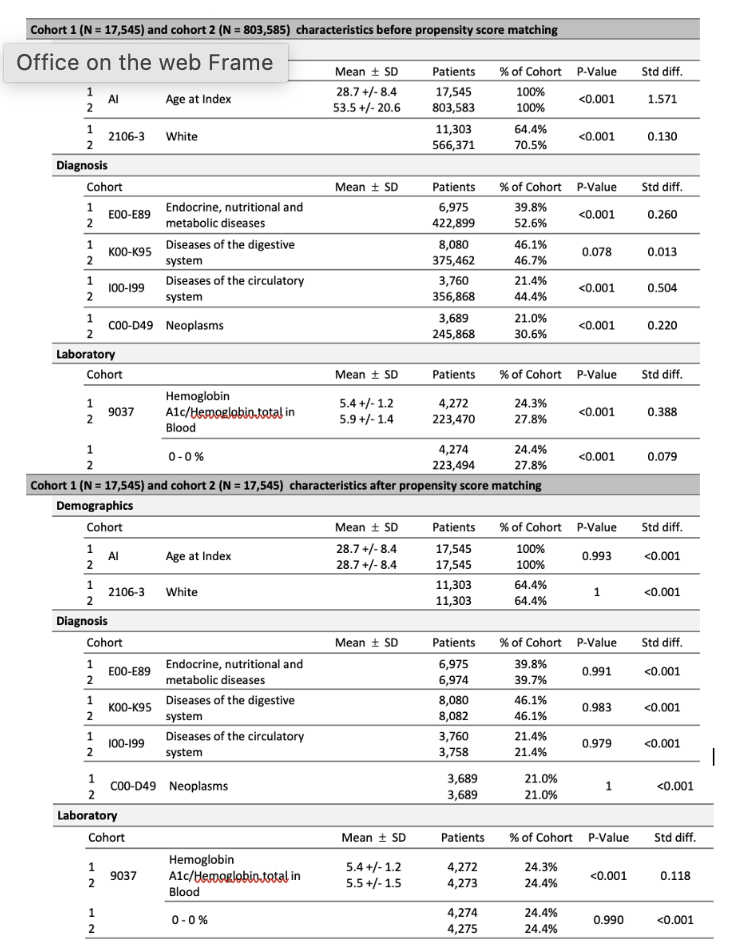Tuesday Poster Session
Category: Liver
P5772 - Incidence of NAFLD, PVT, and HCC in Females With Normal BMI Receiving OCP Therapy: A Propensity-Matched Cohort Analysis
Tuesday, October 28, 2025
10:30 AM - 4:00 PM PDT
Location: Exhibit Hall

Dayana Nasr, MD
SUNY Upstate Medical University Hospital
Syracuse, NY
Presenting Author(s)
Dayana Nasr, MD1, Ahmad Nawaz, MBBS2, Asad Ali, MD1
1SUNY Upstate Medical University Hospital, Syracuse, NY; 2SUNY Upstate Medical University, Syracuse, NY
Introduction: Risk factors for non-alcoholic fatty liver disease (NAFLD) include insulin resistance, obesity, dyslipidemia or a combination of these known as metabolic syndrome. In a previous study, we demonstrated that oral contraceptive pills (OCPs) decreased the incidence of developing NAFLD in females with polycystic ovary syndrome (PCOS). It did not however, affect the risk of developing portal venous thrombus (PVT) or hepatocellular carcinoma (HCC). This prompted us to evaluate if OCPs still a carry a protective role in females with normal BMI regardless of PCOS diagnosis.
The aim of this study is to investigate this relationship and assess the incidence of the other two outcomes: PVT and HCC.
Methods: Data was obtained from the TRINETX database, identifying female patients aged 18 years and above with a normal BMI using ICD-10 codes Z68.21 through Z68.24. Patients were divided into two groups: those who had received or are receiving OCPs and those not receiving OCPs. A 1:1 propensity score matching was conducted based on baseline demographics, comorbidities, and laboratory parameters. The outcomes investigated were the development of NAFLD, PVT and HCC.
Results: After propensity score matching, both groups included 17545 patients. Patients not receiving OCP therapy exhibited higher incidence of developing NAFLD than those on OCPs [OR 0.569, 95% CI ((0.463, 0.700)]. The risk of developing PVT and HCC did not seem to be influenced by OCPs [OR 0.525, 95% CI (0.244, 1.130)] and [OR 0.908, 95% CI (0.386, 2.138)] respectively.
Discussion: In a propensity-matched analysis of large patient cohort, OCP therapy in female patients with normal BMI was associated with reduced risk of developing NAFLD. Furthermore, the results showed no significant increase in the incidence of PVT and HCC. These findings were similar to our previously documented findings in females with PCOS receiving OCP therapy. There is a need to further explore this association between OCPs and NAFLD especially since hormonal therapy does not seem to result in progression of liver disease or development of other liver complications.

Figure: Table 1: Baseline characteristics of patients with PCOS with and without OCPs, before and after a 1:1 propensity matching of the groups based on baseline demographics comorbidities and lab values

Figure: Table 2: Effect of OCPs on the incidence of NAFLD, PVT and HCC after a 1:1 propensity matching of the groups based on baseline demographics, comorbidities and lab values.
Disclosures:
Dayana Nasr indicated no relevant financial relationships.
Ahmad Nawaz indicated no relevant financial relationships.
Asad Ali indicated no relevant financial relationships.
Dayana Nasr, MD1, Ahmad Nawaz, MBBS2, Asad Ali, MD1. P5772 - Incidence of NAFLD, PVT, and HCC in Females With Normal BMI Receiving OCP Therapy: A Propensity-Matched Cohort Analysis, ACG 2025 Annual Scientific Meeting Abstracts. Phoenix, AZ: American College of Gastroenterology.
1SUNY Upstate Medical University Hospital, Syracuse, NY; 2SUNY Upstate Medical University, Syracuse, NY
Introduction: Risk factors for non-alcoholic fatty liver disease (NAFLD) include insulin resistance, obesity, dyslipidemia or a combination of these known as metabolic syndrome. In a previous study, we demonstrated that oral contraceptive pills (OCPs) decreased the incidence of developing NAFLD in females with polycystic ovary syndrome (PCOS). It did not however, affect the risk of developing portal venous thrombus (PVT) or hepatocellular carcinoma (HCC). This prompted us to evaluate if OCPs still a carry a protective role in females with normal BMI regardless of PCOS diagnosis.
The aim of this study is to investigate this relationship and assess the incidence of the other two outcomes: PVT and HCC.
Methods: Data was obtained from the TRINETX database, identifying female patients aged 18 years and above with a normal BMI using ICD-10 codes Z68.21 through Z68.24. Patients were divided into two groups: those who had received or are receiving OCPs and those not receiving OCPs. A 1:1 propensity score matching was conducted based on baseline demographics, comorbidities, and laboratory parameters. The outcomes investigated were the development of NAFLD, PVT and HCC.
Results: After propensity score matching, both groups included 17545 patients. Patients not receiving OCP therapy exhibited higher incidence of developing NAFLD than those on OCPs [OR 0.569, 95% CI ((0.463, 0.700)]. The risk of developing PVT and HCC did not seem to be influenced by OCPs [OR 0.525, 95% CI (0.244, 1.130)] and [OR 0.908, 95% CI (0.386, 2.138)] respectively.
Discussion: In a propensity-matched analysis of large patient cohort, OCP therapy in female patients with normal BMI was associated with reduced risk of developing NAFLD. Furthermore, the results showed no significant increase in the incidence of PVT and HCC. These findings were similar to our previously documented findings in females with PCOS receiving OCP therapy. There is a need to further explore this association between OCPs and NAFLD especially since hormonal therapy does not seem to result in progression of liver disease or development of other liver complications.

Figure: Table 1: Baseline characteristics of patients with PCOS with and without OCPs, before and after a 1:1 propensity matching of the groups based on baseline demographics comorbidities and lab values

Figure: Table 2: Effect of OCPs on the incidence of NAFLD, PVT and HCC after a 1:1 propensity matching of the groups based on baseline demographics, comorbidities and lab values.
Disclosures:
Dayana Nasr indicated no relevant financial relationships.
Ahmad Nawaz indicated no relevant financial relationships.
Asad Ali indicated no relevant financial relationships.
Dayana Nasr, MD1, Ahmad Nawaz, MBBS2, Asad Ali, MD1. P5772 - Incidence of NAFLD, PVT, and HCC in Females With Normal BMI Receiving OCP Therapy: A Propensity-Matched Cohort Analysis, ACG 2025 Annual Scientific Meeting Abstracts. Phoenix, AZ: American College of Gastroenterology.
